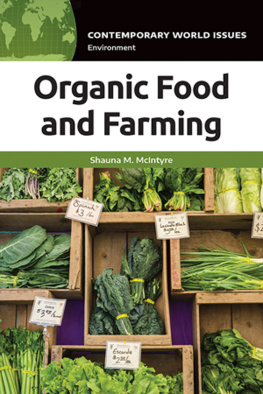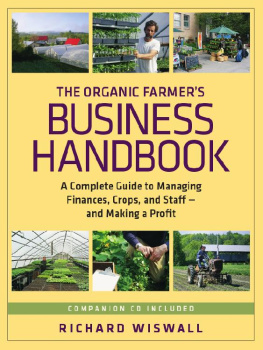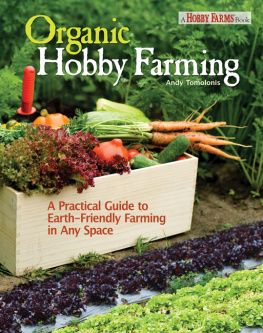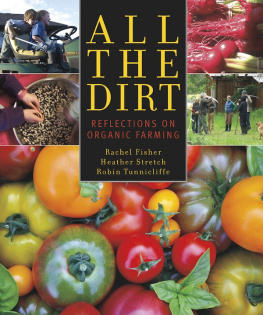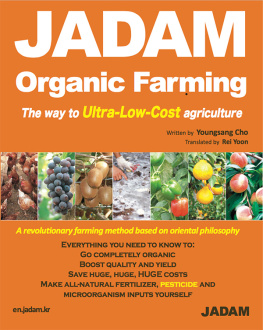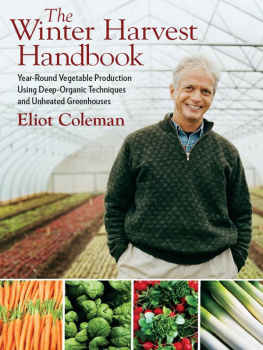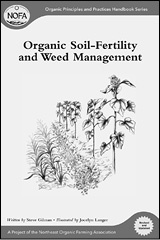Organic Food and Farming
Recent Titles in the
CONTEMPORARY WORLD ISSUES
Series
Media, Journalism, and Fake News: A Reference Handbook
Amy M. Damico
Birth Control: A Reference Handbook
David E. Newton
Bullying: A Reference Handbook
Jessie Klein
Domestic Violence and Abuse: A Reference Handbook
Laura L. Finley
Torture and Enhanced Interrogation: A Reference Handbook
Christina Ann-Marie DiEdoardo
Racism in America: A Reference Handbook
Steven L. Foy
Waste Management: A Reference Handbook
David E. Newton
Sexual Harassment: A Reference Handbook
Merril D. Smith
The Climate Change Debate: A Reference Handbook
David E. Newton
Voting Rights in America: A Reference Handbook
Richard A. Glenn and Kyle L. Kreider
Modern Slavery: A Reference Handbook
Christina G. Villegas
Race and Sports: A Reference Handbook
Rachel Laws Myers
World Oceans: A Reference Handbook
David E. Newton
First Amendment Freedoms: A Reference Handbook
Michael C. LeMay
Medicare and Medicaid: A Reference Handbook
Greg M. Shaw
Books in the Contemporary World Issues series address vital issues in todays society such as genetic engineering, pollution, and biodiversity. Written by professional writers, scholars, and nonacademic experts, these books are authoritative, clearly written, up-to-date, and objective. They provide a good starting point for research by high school and college students, scholars, and general readers as well as by legislators, businesspeople, activists, and others.
Each book, carefully organized and easy to use, contains an overview of the subject, a detailed chronology, biographical sketches, facts and data and/or documents and other primary source material, a forum of authoritative perspective essays, annotated lists of print and nonprint resources, and an index.
Readers of books in the Contemporary World Issues series will find the information they need in order to have a better understanding of the social, political, environmental, and economic issues facing the world today.
CONTEMPORARY WORLD ISSUES
Organic Food and Farming
A REFERENCE HANDBOOK
Shauna M. McIntyre

Copyright 2021 by ABC-CLIO, LLC
All rights reserved. No part of this publication may be reproduced, stored in a retrieval system, or transmitted, in any form or by any means, electronic, mechanical, photocopying, recording, or otherwise, except for the inclusion of brief quotations in a review, without prior permission in writing from the publisher.
Library of Congress Cataloging-in-Publication Data
Names: McIntyre, Shauna M., author.
Title: Organic food and farming : a reference handbook / Shauna M. McIntyre.
Description: Santa Barbara, California : ABC-CLIO, [2021] | Series: Contemporary world issues | Includes bibliographical references and index.
Identifiers: LCCN 2020033440 (print) | LCCN 2020033441 (ebook) | ISBN 9781440870033 (hardcover) | ISBN 9781440870040 (ebook)
Subjects: LCSH: Organic farming. | Natural foods.
Classification: LCC S605.5 .M347 2021 (print) | LCC S605.5 (ebook) | DDC 631.5/84dc23
LC record available at https://lccn.loc.gov/2020033440
LC ebook record available at https://lccn.loc.gov/2020033441
ISBN: 978-1-4408-7003-3 (print)
978-1-4408-7004-0 (ebook)
252423222112345
This book is also available as an eBook.
ABC-CLIO
An Imprint of ABC-CLIO, LLC
ABC-CLIO, LLC
147 Castilian Drive
Santa Barbara, California 93117
www.abc-clio.com
This book is printed on acid-free paper 
Manufactured in the United States of America
Contents
Organic farming has grown from a fringe community to a booming business with billions of dollars at stake. Nearly every food retailer in the United States carries at least some organic food products, and most Americans buy organic food occasionally. Why has it grown to be such a popular commodity? Many people believe that organic food is better for themselves or the environment, but very few can actually describe exactly what makes it organic. Plenty of people question if it is really better or if it is just a marketing ploy. These questions and many more are answered in this book.
In an era of fake news and misinformation, it can be hard to determine what is fact and what is fiction. Everyone has to eat. I believe that everyone should be able to understand what choices they are making at the grocery store and how those choices impact others and the earth. I wrote this book because I believe that having access to good information is necessary to make good choices. This book draws on academic and peer-reviewed sources to provide a balanced overview of organic food and farming and a starting point for finding other good sources of information. I cover ways in which organic fails to meet expectations alongside the ways in which it is successful. I cover the issues that most commonly land in the headlines and those that impact the farming community the most. Organic farming came about because a few individuals were dissatisfied with the scientific and commercial direction that farming had taken. Others joined as they tried and failed at making chemical farming a success. This book provides a comprehensive overview of the growth of organic both as an industry and a social movement and the inherent challenges that occur from trying to be both. It covers controversies such as hydroponics, the dairy crisis, GMOs, and labeling fraud. It discusses the role of farmers, processors, and retailers in the growth of the industry and how it has evolved since the development of a federal certification program. It goes beyond that to discuss how farmers continue to struggle with the tension between certification and the philosophical underpinnings of organic agriculture.
begins with a short overview of the history of agriculture and describes the origins of organic farming. It delves into the historical context that led to the development of an alternative agriculture including the social, economic, technological, and political issues that drove it forward or held it back. It follows the creation of federal regulation and support for organic farming and the impact it had on the organic farming community and food production sector. In a matter of a couple decades, organic food went from being a tiny, almost invisible, segment of food sales to a booming industry with global reach. The first chapter looks at how organic farming has become both mainstream and a part of the local alternative food networks that have been established across the country.
begins by presenting the current evidence on the most common questions and myths about organic farming and food, including the impact on human health and the environment. I explore the role that organic farming might play in addressing the climate crisis and whether it can extend its reach into social justice issues. Next, I describe several crises and controversies occurring in the organic sector and what steps might be taken to address these problems.
offers up a wonderful collection of essays from farmers, academics, and others in the organic sector who share their own insights and perspectives on topics such as research, GMOs, and farming challenges.

